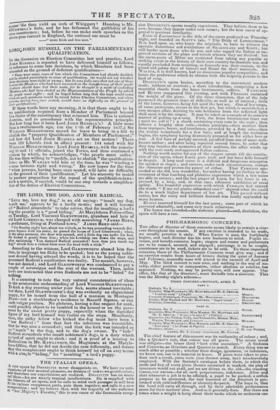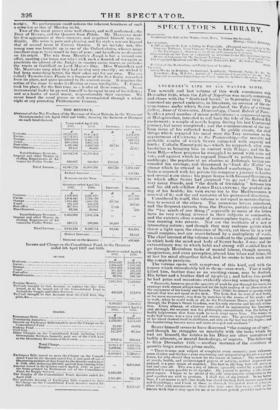PHILHARMONIC CONCERTS.
THE office of director of these concerts seems likely to remain a sine- cure throughout the season. If any exertion is intended to be made, we usually perceive it early. When Easter is past, the hurlyburly begins, and each director has his own business to mind. Pupils in- crease, and benefit-concerts begin; singers and rooms and performers are to be coaxed, secured, and engaged ; patronage is to be sought, countesses are to be sued, tickets are to be sold. To these important concerns, those of the Philharmonic Concerts must give way ; and if no exertion results from hours of leisure during the quiet of January and February, assuredly none will attend in the turmoil of April and May. The third concert is now over, and nothing in the way of no- velty, either positive or comparative, either absolute or relative, has appeared. Nothing, we may be pretty sure, will now appear. Our office, like that of the directors', must dwindle into a sinecure. This was the Monday night's scheme— THIRD CONCERT—MONDAY, •PRIL 2.
PART I. Sittfonia, No. 9 MOZART. Tersetto, Miss WOODTATT,Mr.M•NVIRS,and Mr. E. Sams,
" Loutani canti" (Joseph) Mum. Concerto Putlietique, Pianerorte, Mr. MOSCHSLES MOSCHELZS. DOOM, Mil% Masson and Mr. MANVRRS, " VOrrOi" HAYDN. Overture, Coridlou.
PART it.
Sinronia, No. 3 Senna. Quartetto, Miss WOODYATT, MiSS MANSON, Mr. MANVERS,•nd
Mr. E. Ssotrist, 0 II cor, e la 'Dia le" (Fidelio) Quartette, two Violins. Viola, and Violoncello, Messrs. Moat, ISERTROVRN4 WATTS, T01.11ECQUS, and LINDLEY MOZART. Terzetto, Miss WOODVATT,MiSS M ASSON, and Mr. E. SEGUIN. " EWA 01111■1" (La Noise di Figaro) Masa?. Overture, Jubilee C. M. you Wants; Leader, Mr. T. COOKE—Conductor, Mr. POTTSR.
The chief feature of this concert was its uniformity of colour ; and, like a Quaker's suit, that colour was all grave. The minor mood was obligato—the lesser third "lord o'the ascendant." A Sinfonia and Concerto, an Overture and Quartet to match. Every thing was as much alike as possible ; whether from design, ignorance, or indolence, we know not, nor is it material to know. If pains were taken to pro- duce such a result, pains were (not thrown away, but) mischievously employed. With the Society's catalogue before tbem, in which the mode and key of every piece therein contained is marked, the plea of ignorance would not avail, and we are driven to the old—the standing reason, not excuse—for all such perpetrations, indolence. Alive and alert whenever a job is to be effected, a pupil to be pushed, a selfish purpose to be answered, the real business of the directors is per- formed with cold indifference or slovenly despatch. The hope is, that the band will carry all through, and by their admirable performance atone for their masters' sins. And so it generally does. But there are times when a weight is hung about their necks which no orchestra can
Sustaiii. No performance could redeem the inherent heaviness of such a selec ion as that of Monday niebt. • Two of the vocal pieces were well chosen, and well performed—the
Duet of HAYDN, and the Quartet from Fide Mr. Maeveus made his first appearance at these concert:. and acquitted himself very cre- ditably. His voice is pure and pleasing, and his style a remove beyond that of second tenor at Covent (arden. If we mistake not, this young man was brought up in one of the Oxford choirs, whence many excellent singers have leaned in days of yore ; and he reflects no diseredit on his origin. The trio from MF.141.11:6 Joseph is but a second-rate affair. opening (we know not why) with sueh a flourish of tiumpets as proclaims the advent of the .Tudges in country assize towns, or preludes the toasts at Guildhall on Lord Mayor's Day. Miss Woonylver and Mr. MANVERS sung what they had to shig very sweetly ; we wished it had been something better, for their sakes and for our own. The so called) Terzetto from Figaro is a fragment of the first fieate, wrenched from its place, and quite unsuited to the concert.room. It requires the action of the stage to make it effective or even intelligible. T. Coolie took his place, for the first time, as a leader of these concerts. As au instrumental leader he proved himself to be equal to any of his fellows; and as a leader of vocal music, unquestionably their superior. AVe never heard the vocal pieces so well accompanied through it whole night at any preceding Philharmonic Concert.



























 Previous page
Previous page